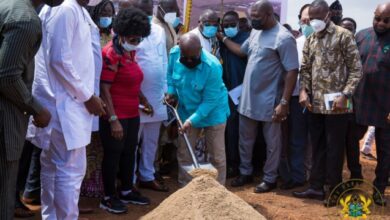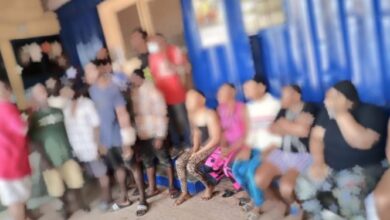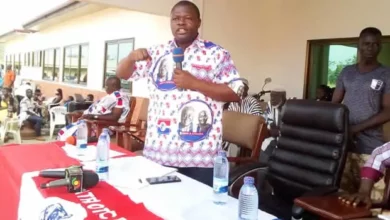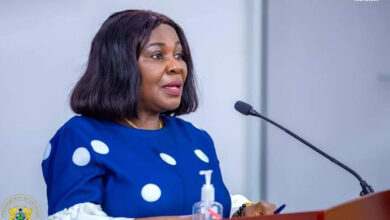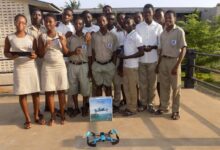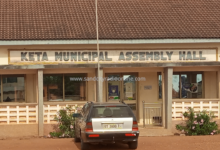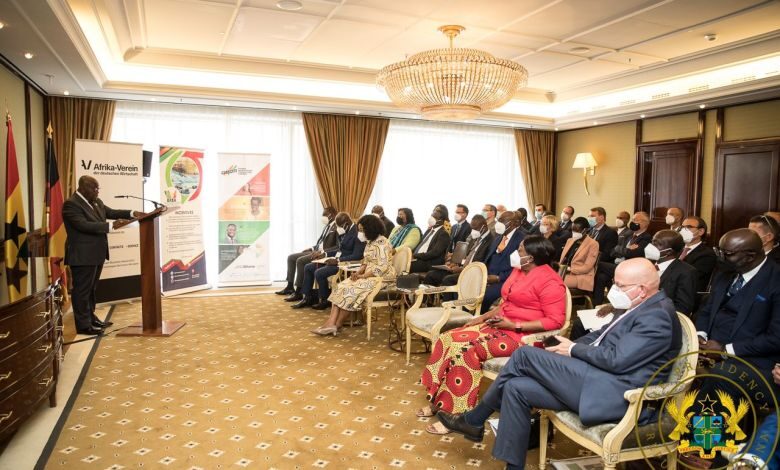
The president tells German business leaders that his government has put in place measures needed to reduce the cost of doing business
President Nana Addo Dankwa Akufo-Addo has said that Ghana will continue to protect legitimate investments and preserve the atmosphere of peace for businesses to thrive.
“We will continue to create and maintain a conducive investment environment that not only guarantees the safety of investments, but good returns as well.
“We will continue to protect legitimate investments, and preserve the atmosphere of peace, stability and security that has been an important contributor to the increasing presence of German businesses in Ghana,” Akufo-Addo told the Ghana-Germany Business Forum, in Dusseldorf, during his working visit to the Federal Republic of Germany.
Addressing the Forum, Akufo-Addo noted that Ghana is a country where the principles of democratic accountability and respect for the rule of law, individual liberties and human rights are now firmly entrenched in the body politic, and where there is a real separation of powers that promotes accountable governance.
Reduction in cost of doing business
He told Forum members that since assuming office in January 2017, his government has put in place measures needed to reduce the cost of doing business and improve the business environment. This has made the Ghanaian economy not only one of the most business-friendly economies in Africa, but also one of the fastest-growing economies in the world between 2017 and 2020, averaging annual GDP growth rates of 7% for those years, up from the 3.4% growth rate inherited from the Mahama government in 2016.

“Indeed, with the economies of many countries around the world in recession, having recorded negative growth in 2020, largely as a result of the COVID-19 pandemic, Ghana’s economy was one of the very few that still managed to record a positive GDP growth, albeit a very modest 0.9%,” he said.
“In spite of the ravages of the pandemic, we are working to grow the economy at a much faster rate this year, our target being a 5% GDP growth rate, which will enhance the prospects of a win-win environment for both private sector and country; an environment where companies do not just survive, but actually thrive.
“In the first quarter of this year, the GDP of the economy grew at 3.1%; in the second, at 8.9%.”
He was thus encouraged that more German companies than ever are looking to invest in Ghana, symbolised by the opening of representations in the country for the German industry giant ThyssenKrupp and the German-headquartered global logistics player Kühne & Nagel, as well as the establishment of the Volkswagen Assembly Plant in Ghana.
“It continues to be an exciting time to be in Ghana and to do business in the country,” the president said. “Already, other global car manufacturing giants – Toyota and Nissan of Japan, Sinotruk of China – have also established assembly plants in the country. Twitter is establishing its African headquarters in Ghana, Google’s first African artificial intelligence centre is located in Ghana, and the well-known Norwegian energy company Aker is very much established in Ghana.”
He told the Forum further that Ghana is further privileged to play host to the Secretariat of the African Continental Free Trade Area, which currently represents a market of some 1.2 billion people, spread over 54 countries with a combined GDP of US$3 trillion.
Business-friendly climate
With records from the Ghana Investment Promotion Centre showing that there have been 192 projects in total registered from Germany within the past decade, with an FDI value of $83.92 million, he urged business leaders in Germany to take advantage of the business-friendly climate in the country to invest in Ghana.
He recommended the government’s flagship policies such as One District, One Factory, One Village, One Dam, and the programme for Planting for Food and Jobs. The president also touched on developments in the water, health, housing, road and rail infrastructure and transport sectors, as well as the growth in industry, manufacturing, agriculture and oil and gas. He pointed to the exploitation of Ghanas mineral wealth of bauxite, iron ore and gold, and its growing potential in the renewable energy and ICT industries.
“We are hopeful that, with solid private sector participation, we can develop a modern railway network with strong production centre linkages and with the potential to connect us to our neighbours. Indeed, Ralf Blankenbach and Havelländische Eisenbahn of Germany are part of a European consortium engaged in the $1.8 billion rehabilitation of the existing Eastern railway line from Accra to Kumasi,” he said.
Story by Asaaseradio
